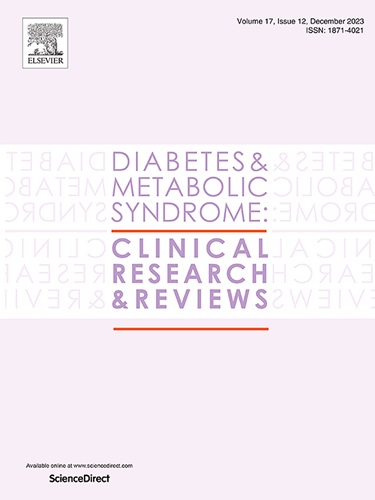Dipeptidyl peptidase-4 inhibitors may lower body temperature: A case-control study
IF 3.4
Q1 ENDOCRINOLOGY & METABOLISM
Diabetes & Metabolic Syndrome-Clinical Research & Reviews
Pub Date : 2024-10-01
DOI:10.1016/j.dsx.2024.103142
引用次数: 0
Abstract
Aims
Dipeptidyl peptidase-4 inhibitors (DPP4i) enhance GABAergic transmission via the glucagon-like peptide-1 (GLP-1)/GLP-1 receptor pathway. Oral γ-aminobutyric acid (GABA) administration reduces body temperature in humans; thus, DPP4i may reduce body temperature in humans. Therefore, this study aimed to determine the effects of DPP4i administration on the body temperature of patients with type 2 diabetes (T2D).
Methods
This study included 128 outpatients with T2D who visited the hospital monthly from May to July 2022. The DPP4i group included 64 patients treated with DPP4i while the non-DPP4i group included 64 patients not treated with DPP4i. Body temperature was measured at the axilla point upon entry to the hospital and was compared between the two groups.
Results
The means of age, body mass index, T2D duration, systolic blood pressure, diastolic blood pressure, serum creatinine level, casual triglyceride level, high-density lipoprotein cholesterol level, low-density lipoprotein cholesterol level, casual plasma glucose level, and glycated hemoglobin level were not significantly different between the two groups. The mean body temperatures (°C) were 36.1 ± 0.2 and 36.4 ± 0.17 in the DPP4i and non-DPP4i groups, respectively (p = 1.123 E−05).
Conclusions
DPP4i reduced the body temperature of patients with T2D.
二肽基肽酶-4 抑制剂可能会降低体温:病例对照研究
目的:二肽基肽酶-4抑制剂(DPP4i)可通过胰高血糖素样肽-1(GLP-1)/GLP-1受体途径增强GABA能传导。口服γ-氨基丁酸(GABA)可降低人体体温,因此,DPP4i可能会降低人体体温。因此,本研究旨在确定服用 DPP4i 对 2 型糖尿病(T2D)患者体温的影响:本研究纳入了128名门诊2型糖尿病患者,他们于2022年5月至7月期间每月到医院就诊。DPP4i组包括64名接受DPP4i治疗的患者,而非DPP4i组包括64名未接受DPP4i治疗的患者。入院时在腋窝测量体温,并对两组患者的体温进行比较:结果:两组患者的年龄、体重指数、T2D病程、收缩压、舒张压、血清肌酐水平、临时甘油三酯水平、高密度脂蛋白胆固醇水平、低密度脂蛋白胆固醇水平、临时血浆葡萄糖水平和糖化血红蛋白水平均无显著差异。DPP4i 组和非 DPP4i 组的平均体温(°C)分别为 36.1 ± 0.2 和 36.4 ± 0.17(p = 1.123 E-05):结论:DPP4i能降低T2D患者的体温。
本文章由计算机程序翻译,如有差异,请以英文原文为准。
求助全文
约1分钟内获得全文
求助全文
来源期刊

Diabetes & Metabolic Syndrome-Clinical Research & Reviews
ENDOCRINOLOGY & METABOLISM-
CiteScore
22.90
自引率
2.00%
发文量
248
审稿时长
51 days
期刊介绍:
Diabetes and Metabolic Syndrome: Clinical Research and Reviews is the official journal of DiabetesIndia. It aims to provide a global platform for healthcare professionals, diabetes educators, and other stakeholders to submit their research on diabetes care.
Types of Publications:
Diabetes and Metabolic Syndrome: Clinical Research and Reviews publishes peer-reviewed original articles, reviews, short communications, case reports, letters to the Editor, and expert comments. Reviews and mini-reviews are particularly welcomed for areas within endocrinology undergoing rapid changes.
 求助内容:
求助内容: 应助结果提醒方式:
应助结果提醒方式:


